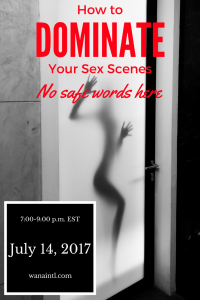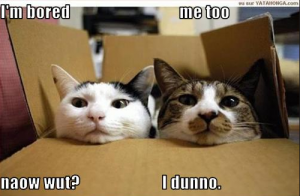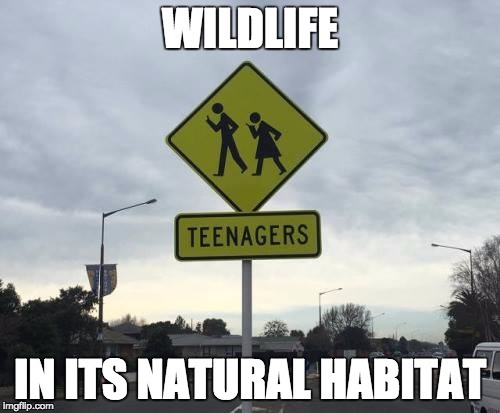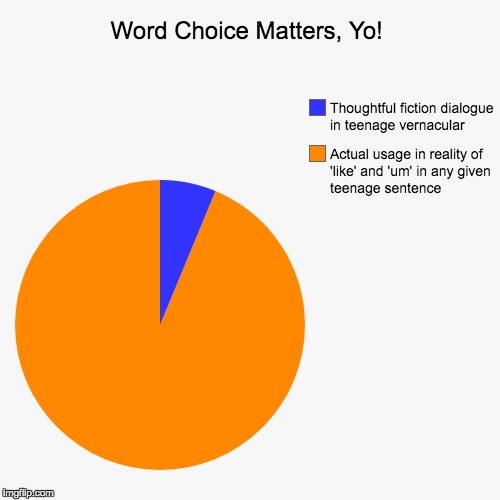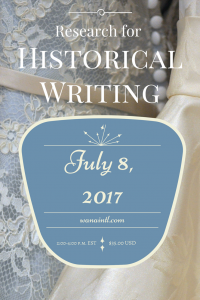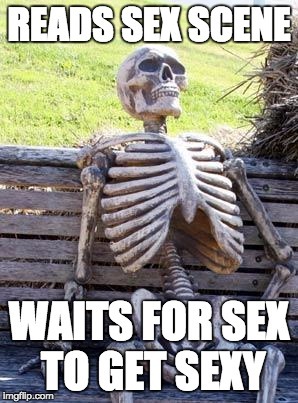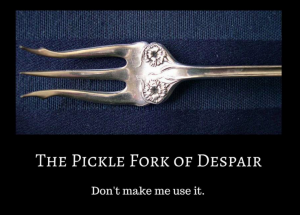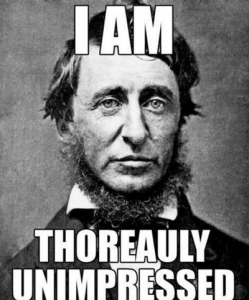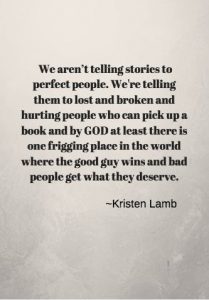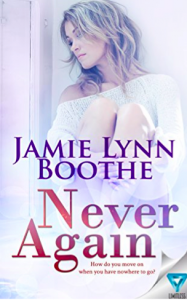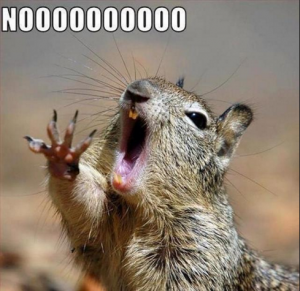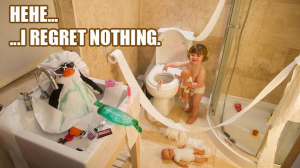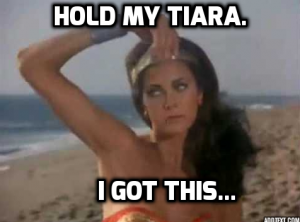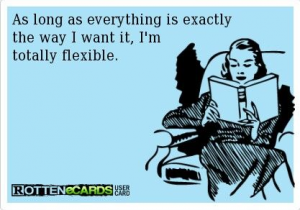Kristen Lamb's Blog, page 30
July 12, 2017
Getting Punk’d by Steampunk
 There is nothing wrong with sitting in a bar on Halloween wearing steampunk. Even if no one else is.
There is nothing wrong with sitting in a bar on Halloween wearing steampunk. Even if no one else is.It’s me! I’m back! It’s another #SquattersRights day on Kristen Lamb’s blog, and today, I’ll be talking to you about steampunk (and no, you do not capitalize it because it is just another genre like horror, fantasy, or romance).
Some people like to credit Will Smith with ushering in the great age of steampunk because of that stellar cinematic festival of delight: ‘Wild Wild West.’ However, they are wrong. Steampunk originated with the original badass Victorians who actually used steam and their imaginations to dream up some crazy shizz.
What’s that I hear? The cat call for me to name them?
H.G. Wells. Jules Verne. You might even argue that some of Edgar Allan Poe’s lesser-known stories dipped a timorous toe into steampunk.
So, what is steampunk? Ha! Trick question. I’m not going to define it because there are far too many sites out there that spend blog post after blog post debating the finer delineations and spraying down commenters with flame throwers. I could say it’s kind of like pornography. I can’t define it, but I know it when I see it.

What I will do is share with you some of the key characteristics of steampunk and how to avoid the world-building pitfalls that make readers flip tables and leave books in the DNF (Did Not Finish) pile. Obviously there is a lot to world-building that is common to all genres, but a few things are specific to steampunk, and while they are part of what make the genre so fun, they also require more work than most we generally think. At least, if we want to do the job well and play the role of frantic slave to KENP. (See my manifesto, er, blog post over at caitreynolds.com)
Victorian, Schmictorian
The first question we have to ask in creating a steampunk world is just how Victorian do we want to get? An undeniable part of the charm of steampunk is the contrast between the stodgy, fussy prissiness of Victoriana and the wild, unexpected consequences of ‘steam science’ upsetting the well-ordered apple cart of society.
You probably know what I’m going to say here. Wait for it…wait for it…
That delightful contrast can only be created if we do the research.
Boston in 1875 was a very different place from London in 1881, and even more different than Paris of 1890. I’m not talking just about the style of dress, which went from bustles to leg-o-mutton sleeves. I’m talking about political movements, social changes from abolitionism to colonialism, the development of the modern police force and formalized investigative techniques, and that little tiny detail of scientific progress and industry.
A lot of writers make the mistake of thinking that just because they are writing steampunk, they can get away with not doing research. They couldn’t be more wrong, and it shows in their shoddy, unbelievable world-building. Even worse is when writers mention something that they think would be a cutting-edge invention, yet the invention had in reality already been around for several years.

Without a firm grounding in historical knowledge, steampunk produces characters that are anachronistic (I’m looking at you, feisty heroine who doesn’t want to get married and wants to be an inventor), a society that is a poor pantomime of actual Victorian manners and beliefs, and steampunkish inventions that are trite and unexciting.
Feathers and Flying Machines
Dirigibles, ether, and time travel machines are some of the stock technical steampunk ‘accessories.’ It can be a lot of fun to figure out how to reverse engineer today’s gadgets and make them work using the technology, tools, and material available in the 19th century.
But, creating the technological and mechanical anomalies of steampunk is a delicate balancing act. If we fall off to one side, we risk over-complicating things with gadgets that are irrelevant to the plot. If we fall off to the other side, we fail to come up with anything really interesting or useful to the story. So, how do we avoid doing this?
There are a couple of things we can do.
First, decide exactly what year we are writing about. I don’t care if I pick it out of a hat, but if 1877 is the year that comes up, then that is what I am going to use. Why? Because I need to the year I’m going to base all my research on. In addition to all the general historical research I’ll do, I will go further and read everything I can about the state of science, industry, and transportation in that year. By doing this, I’ll know precisely what scientific advancements they had achieved, how they traveled, and what machines were being used and invented. I’ll also read about the state of medicine to know just how badly I can injure my characters or how sick I can make them while giving them a fighting chance at recovery.
It’s easy to get overwhelmed at this point, so instead of trying to upgrade everything mechanical to steampunk, I’ll narrow it down to two or three things that I want to be fun and different – always provided that they are relevant to the plot. I’ll figure out what the machine does, what it doesn’t do, what can break it, what can fix it, and what powers it. I’ll give it some features that are futuristic or advanced, but I will also set firm limits on what it can do.
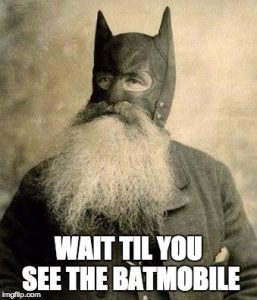
All of this has to be based on facts, with logic and rules guiding the creation of the steampunk features of the story. Because of the complexity of world-building, steampunk requires an almost religious adherence to logic in order to keep the reader from getting lost in confusing details and conflicting ideas.
Oh, and while I’m at it, let’s just get one thing perfectly clear: there is no reason for characters to wear hats and gloves inside the home, nor would any self-respecting woman wear her corset on the outside of her clothing. It’s not just being a stickler for historical details. It’s about logic.
Now, if my characters need to wear a wrist brace, I will make sure that the gadgets or weapons on the brace are absolutely necessary to the plot and will come in handy late by being either exactly what the character needs or exactly what he/she doesn’t need (therefore creating more fun…er…conflict). This also goes for goggles. Characters are not going to wear their goggles on their heads or hats unless they are actively in the middle of something that would require them, or they soon will be. While outlandish steampunk fashion looks cool on book covers, a more reasonable nod to reality makes for a more enjoyable, organic story for the reader.
Gaskets and Gaiters
Naturally, this is merely a fraction of what I have to say about steampunk world-building. Given a chance, I can rant by the hour. In fact, Kristen has given me a chance to rant…er…instruct by the hour. I’m teaching an entire class on steampunk!
 Click on the image to register!
Click on the image to register!
Class Title: Gaskets and Gaiters: How to Create a Compelling Steampunk World
Instructor: Cait Reynolds
Price: $35 USD Standard
Where: W.A.N.A. Digital Classroom
When: FRIDAY July 21st, 7:00 PM E.S.T. to 9:00 P.M. EST
Who doesn’t love some steampunk cosplay? Corsets, goggles, awesome hats…
Steampunk has become one of the hottest genres today, crossing the lines of YA, NA, and adult fiction. It seems like it’s fun to write because it’s fun to read. However, there’s a world of difference between the amateur steampunk writer and the professional steampunk author, and the difference lies in the world they create.
Is your steampunk world historically-accurate enough not to jar the reader out of the narrative with anachronisms?
Does your world include paranormal as well as steampunk?
Are the gadgets and level of sophistication in keeping with the technologies available at the time?
Steampunk is not an excuse to take short-cuts with history. Good writing in this genre requires a solid grasp of Victorian culture and history, including the history of science, medicine, and industry. This shouldn’t scare you off from writing steampunk, but it should encourage you to take this class and learn how to create a world that is accurate, consistent and immersive.
This class will cover a broad range of topics including:
Polite Society: Just how prim and Victorian do you want to get?
Science, Technology, Medicine, and Industry: How to research these without dying of boredom?
Creating the Blend: How to drop in historical details without info-dumping, and how to describe and explain your steampunk innovations without confusing.
Register here!
****Just FYI, in an effort to combat spammers your comment won’t appear until I approve it, so don’t fret if it doesn’t appear right away.
Talk to me! And MAKE SURE to check out the classes below and sign up! Summer school! YAY!
For the month of JULY, for everyone who leaves a comment, I will put your name in a hat. If you comment and link back to my blog on your blog, you get your name in the hat twice. What do you win? The unvarnished truth from yours truly.
I will pick a winner once a month and it will be a critique of the first 20 pages of your novel, or your query letter, or your synopsis (5 pages or less).
NEW CLASSES WITH CAIT REYNOLDS!
Obviously, I have my areas of expertise, but I’ve wanted for a long time to fill in some gaps on classes I could offer.
Cait Reynolds was my answer.
She is an unbelievable editor, mentor and teacher and a serious expert in these areas. She consults numerous very successful USA Today and NYTBS authors and I highly, highly recommend her classes.
How to Dominate Your Sex Scenes (No Safe Words Here) July 14th $40 w/ Cait Reynolds
Shift Your Shifter Romance into High Gear July 15th $35 Basic/ $75 GOLD/ $125 PLATINUM
Gaskets and Gaiters: How to Create a Compelling Steampunk World July 21st $35 w/ Cait Reynolds
Lasers & Dragons & Swords, Oh MY! World Building for Fantasy & Science Fiction July 28th w/ Cait Reynolds $35/ GOLD $75/ PLATINUM $125
Classes with MOI!
Plotting for Dummies July 13th $35 ($250 for GOLD)
Blogging for Authors July 20th $50 ($150 for GOLD)
Branding for Authors July 27th $35
Classes with Lisa Hall-Wilson
Growing An Organic Platform On Facebook July 22nd $40
July 10, 2017
The Creative Benefits of Being BORED
Hey everyone! Remember me? It’s Kristen and I’m back and yes of course I missed all of you dearly. In this blog, I’ve always worked to be transparent with you guys so you knew it was okay to be human. Lately, I’ve been very very human as in seriously exhausted and burned out. Working is easy for me. Resting?
That requires an intervention.
Hey, I’m a work in progress too! 
July 5, 2017
Writing Totally On Fleek YA
It’s Cait again! The coup might be over, but I have now assumed squatters rights on Kristen’s blog. The fun part is that you never know when I’m going to pop up and come at you with stuff that is unusual, unsettling, and occasionally unnatural.
Today, I’m going to talk about writing young adult (YA) fiction. In the past decade, YA has experienced a renaissance and earned ‘theme park money’ for some lucky authors (I’m looking at you, sparkly vampire lady). Some YA has become incredibly sophisticated and gone to really challenging places both with its characters and subject matter (hello, dystopian-commentary-on-society and too-young-and-in-love-to-die-from-cancer books).
On the other hand, there is some really, really, really bad YA out there. Bathetic. Trite. Cringe-worthy.
The question is, how do we avoid all the traps and pitfalls that lead us to commit atrocities (i.e. write books) that are doomed to dwell in the 400,000 rankings on Amazon?
When Writers Need to be Grounded
When I wrote Downcast, I periodically went through my old yearbooks, notes I used to pass back and forth with my friends in classes, my old diaries from the time, and even a few of the papers I wrote for classes and kept for whatever reason. There was a method to my madness, because it’s absolutely madness to want to go back and torment yourself with looking at your yearbook photo from freshman year. (Note: if I get ten comments or more on this post, I will upload a copy of my freshman year photo…that is how much I believe in the cause…or something like that…)
The reason I delved not once, but multiple times into the memories of the micro-dramas and nostalgic optimism of my own high school experience was because it forced me to be realistic about teenagers, even the smart, responsible ones like myself. No other characters come with so much conflict and so many interesting limits already built-in simply by virtue of their age.
Let’s just list out the ways in which we are constrained as writers in working with teenage characters:
Teenagers live at home with their parents or other legal guardian figure;
Teenagers attend school Monday through Friday from 8:00 a.m. to 3:00 p.m.;
Teenagers must face and deal with the same people every day (other students, teachers, etc.);
Teenagers may or may not be able to drive;
Teenagers have curfews at night;
Teenagers generally have a limited income (after-school job, chores, etc.); and,
Teenagers have only had so much life experience in their 14-18 years and therefore almost everything can be and is new for them.
Of course, as writers, we get to break all those rules and constraints if we want. However, as every teenager will tell you, breaking the rules has consequences. The convenience of doing so is a slippery slope of permissiveness, and each exception pulls the character a little further away from reality and being easily identifiable with by the reader. There has to be a really good reason to change one of the baseline constraints for a YA character, and just because we are too lazy to figure out how to work within that particular restriction.
One of the early beta critiques of Downcast complained that it was boring to have the characters going to school every day, that it was…wait for it…repetitive. While I took that particular critique and beta reader with a grain of salt, I didn’t entirely discount her opinion. I knew that given my plot and world-building, there was no reason for these students not to be in school. Instead, I took the idea of repetitiveness and pushed it, turning the school week into something that was inescapable and claustrophobic. The protagonist had to face her tormentors every single day. There was no reprieve, no “I don’t feel like going to work so I won’t” choice. Thus, when things break down the structure and routine, it’s not just a variation. It’s cataclysmic and amps up the tension in the plot.
Like OMG!
So, we’re writing YA. We need to be au courant with the vernacular, the fads, the apps (Vine is sooooo 2015), and the fandoms. However, we run the danger of forgetting we are the grown-ups in this situation.
What does that mean?
It means don’t dumb it down.
Just because we are writing for young adults, we are not automatically required to use words of only two syllables and simple sentence structures. We obviously want to hit the right balance between clarity and casualness, eliminating a lot of the ‘like’s’ and ‘um’s’ that pepper both adult and teenage conversation. That doesn’t preclude the use of a broader, richer vocabulary or taking advantage of the full range of grammatical tricks to create provocative, evocative prose.
While being careful to avoid the verbose pomposity of obstreperous troglodytes, there’s no reason we can’t use words that teenagers might be unfamiliar with, provided we do so naturally and with context that suggests the meaning of the word in a way that mimics the organic process of learning language. YA shouldn’t just be engaging and challenging in the concepts it presents. Teenagers that read YA are at an age where reading should be both a pleasure and a learning experience, driving emotional and intellectual growth.
Also, we need to make sure that the emotions, motivations, and decision-making processes of our characters are easily relatable but not carelessly simplistic. A lack of life experience doesn’t mean that teenagers don’t have complex psychologies (just ask anyone with a teenager), even if they don’t have the vocabulary yet to explain fully.
We must respect our readers, no matter their age, and in return, they will respect us…even if they are teenagers
The Bell May Have Rung, but Class is not Dismissed!
Well, actually, class hasn’t even started yet.
Not surprisingly, I have SO much more to say on YA fiction. Therefore, I am teaching a W.A.N.A. class on it. Here’s the class description and where you can sign up. It’s gonna be totally fun.
 Class Title: OMG, Like How to Write Fleek YA
Class Title: OMG, Like How to Write Fleek YAInstructor: Cait Reynolds
Price: $40 USD Standard
Where: W.A.N.A. Digital Classroom
When: FRIDAY July 7th, 7:00 PM E.S.T. to 9:00 P.M. EST
As long as there are teenagers, there will be a demand for angst-ridden, unabashedly romantic YA fiction. Whether the story is paranormal, dystopian, fantasy, or everyday literary, YA demands the author walk a tightrope between realistically capturing the young adult voice and meeting some very grown-up standards in terms of plot, characters, and style.
Who wants to sound like a tax-paying grownup with a minivan pathetically trying to sound like a teen? Yeah. No one. But it happens ALL the time.
This class will discuss some of the critical issues in crafting a story and characters that truly resonate with the YA audience. Topics include:
Talking like a teenager without describing like a grown-up (or sounding like a dumb@$$)
Tip-toeing through the minefield of sex and swearing
Tropes, types, and technology
Techniques for getting in the mindset to write a YA POV
Teenage-level decision-making skills vs. Too-Dumb-to-Live decisions
REGISTER HERE!
****Just FYI, in an effort to combat spammers your comment won’t appear until I approve it, so don’t fret if it doesn’t appear right away.
Talk to me! And MAKE SURE to check out the classes below and sign up! Summer school! YAY!
For the month of JULY, for everyone who leaves a comment, I will put your name in a hat. If you comment and link back to my blog on your blog, you get your name in the hat twice. What do you win? The unvarnished truth from yours truly.
I will pick a winner once a month and it will be a critique of the first 20 pages of your novel, or your query letter, or your synopsis (5 pages or less).
NEW CLASSES WITH CAIT REYNOLDS!
Obviously, I have my areas of expertise, but I’ve wanted for a long time to fill in some gaps on classes I could offer.
Cait Reynolds was my answer.
She is an unbelievable editor, mentor and teacher and a serious expert in these areas. She consults numerous very successful USA Today and NYTBS authors and I highly, highly recommend her classes.
OMG, Like How to Write On Fleek YA July 7th $40 with Cait Reynolds
Research for Historical Writing – Or, How not to Lose Six Hours on Pinterest July 8 $35 with Cait Reynolds
How to Dominate Your Sex Scenes (No Safe Words Here) July 14th $40 w/ Cait Reynolds
Shift Your Shifter Romance into High Gear July 15th $35 Basic/ $75 GOLD/ $125 PLATINUM
Gaskets and Gaiters: How to Create a Compelling Steampunk World July 21st $35 w/ Cait Reynolds
Lasers & Dragons & Swords, Oh MY! World Building for Fantasy & Science Fiction July 28th w/ Cait Reynolds $35/ GOLD $75/ PLATINUM $125
Classes with MOI!
Plotting for Dummies July 13th $35 ($250 for GOLD)
Blogging for Authors July 20th $50 ($150 for GOLD)
Branding for Authors July 7th $35
Classes with Lisa Hall-Wilson
Growing An Organic Platform On Facebook July 22nd $40
June 23, 2017
The Coup, Day 3 – Putting the Bite in Sex Scenes
It’s Day 3 of the The Coup! This post was supposed to go up yesterday, but between unexpected doctor appointments for myself (I’m fine, but my shoulder is gonna take about 5-8 weeks to heal), my 9th wedding anniversary (we forgot until Facebook reminded us LOL), and an unexpected Denny Basenji vet visit (he’s fine, just pissed off that he is being subjected to medicated wipes), things got a bit…wild.
 Denny Basenji is not amused.
Denny Basenji is not amused.However, we of the revolution are nothing if not stalwart, and to make up for missing yesterday, I promise a SATURDAY post! Maybe even a Sunday post. BOOYAH! Yeah, I know. I’m kind of tearing up from my own generosity, too. Frankly, I’m having so much fun, I may not give the blog back to Kristen after this week. Okay. I might let her post occasionally. We’ll see.
So, today’s topic should be fun, if perhaps a bit edgy. At the very least, I hope to skirt the bounds of propriety and induce mild squirming. I mean, any time you write about sex and writing sex scenes, squirming should be involved.
The Wide World of Sex
There are all kinds of sex scenes with all different levels of heat, from the kiss-fade-to-black and mild groping, all the way to full frontal erotica that tests the limits of our taboos. Aside from providing purposeful or inadvertent wanking material, sex scenes actually can serve a real purpose in the story.
A sex scene can complicate or resolve a relationship. Sex can be used as one of the bad, impulsive, very human decisions that a character makes. Done right, a sex scene is a brutally accurate barometer about the psychological, physical, and emotional state of a character. One character can use sex as misdirection and distraction for another character. Sex scenes can deepen our immersion in the world, identification with the characters, and indulgence in the fantasy and suspension of reality. Finally, sex can be used to explore some of the most profound ideas about human relationships, gender roles, and power.
This is assuming, of course, that it is a well-written sex scene.
A badly written sex scene reads like the bastard offspring of a technical manual and IKEA assembly directions. It’s mechanical, predictable, and worst of all, barely titillating. That is a cardinal crime.
A sex scene must always have some element of arousal to it, and the only exceptions would be describing rape or incest. Even if we are trying to write a scene that is meant to be troubling, part of what makes it disturbing is that something resonates with us. Something about it arouses us physically despite the rational part that knows it’s wrong or dangerous.
The trick is knowing how to define and create what is arousing to us, the characters, and the reader. Yet, doing so is an exercise in uncomfortable vulnerability. I mean, how embarrassing is it to admit we get hot and bothered writing a sex scene? *raises hand* Yes, that has happened to me. Do I like being open about it to you all? No. But, if I don’t have the courage to write sex scenes that turn me on and to share the power of doing so with writers I am coaching, then, I should stick with illustrating IKEA assembly directions.
Friends and Family, Asking ALL the Awkward Questions Since…Forever
So, how do we start?
First, we have to be honest with ourselves about what we find sexy, seductive, dangerous, desirable, and taboo. Also, we have to be honest about what doesn’t appeal to us. This is not to say that our characters have to mirror our tastes perfectly. But, in order to write convincingly for our characters, we have to accept our own likes and dislikes before we bequeath any or all of them on our creations.
The more explicit and daring the sex you write about, the more likely you are to get the question of, “Uh…is your sex life really like that?” Depending on the person and the mood, I have often answered, “No. It’s worse.” In general, however, a good way to shut people up with that invasive question is to pose this question in return: “I wrote about a serial killer. Does that mean I have to be a murderer?”
The only reason we should ever feel embarrassed about writing a sex scene is if it poorly crafted or doesn’t fit in the story. If we put our best work into it, and if it is an organic part of the plot, then we can be fiercely proud of what we have written. Sex is also less ‘noticeable’ as something shocking when it is done well and fits naturally within the story.
Speaking of shocking, whom exactly are we worried about shocking? Parents? Friends? Co-workers? Interestingly, this is one of the biggest hurdles I encounter with many young female writers. There is a crushing trepidation about shocking everyone they know with their writing, whether it’s on the side of dark/twisted/gory or sensual/sexual/explicit. As a result, darkness becomes taupe, and sensuality and sex end up as racy as the raunchiest episode of “Little House on the Prairie” – in other words, not.
I know this fear is a real thing. I was just like that all through my twenties. Then, something changed. Maybe it’s because I turned thirty. Maybe it’s because my ambition and desire to get better at writing reached a point where it was stronger than my shyness. Maybe I realized that despite the fact my father was a psychologist and my mother was a social worker, they wouldn’t judge me for venturing into more adult territory with my ideas. As it turned out, they were incredibly supportive. However, even if they hadn’t been, the most important realization I reached was that my audience was bigger than them. My audience was bigger than my co-workers, former classmates, gym buddies, and Facebook friends.
If it all worked out, then people I had never heard of and would never know would end up reading my book. They wouldn’t know anything about me other than my name and the short bio at the back of the book. I wouldn’t be Cait. I would be abstract. I would be perhaps the least important thing about the book. Whether it was a chaste kiss or a menage a trois BDSM scene, my readers would experience it through my characters. Not me.
And then, I was free.
Free not just to use the “naughty” words, but to tell the full, profound truth about the beauty and menace of sex in human relationships. I was ready to be an author, not just a writer.
Fantasy vs. Reality
I’m just going to put this right out there because I promised I was going to push buttons and stir the pot.
For the love of God, why are men in romance and erotica novels so damn chatty when they are having sex?
Now, hold on. I understand that dirty talk, sweet talk, and other dialogue can be an integral part of both the scene and the fantasy, but seriously, far too many of these guys end up sounding like women who subscribe to Gwyneth Paltrow’s newsletter and want to help the heroine self-actualize through a healthy, accepting sex life.
I’m not saying that there is anything wrong with the ideas, per se. However, if our goal is to write a strong, dominating alpha male, then we have to make him sound different from the women in the story. If the primary character we want the reader to identify with is the heroine, then yes, we want to explore her thoughts and feelings thoroughly. But, the hero needs to remain a bit of a mystery.
There is nothing as frustrating, maddening, and addictive as the dialogue or hint that leaves us (and the heroine) wanting just a bit more to confirm exactly how the hero feels or what he thinks. To echo Kristen Lamb, why make it easy for the characters? To have a hero who confesses his love – in excruciating, and dare I say it, pedantic detail – leaves nothing to be desired. It sets up no problems to solve and leaves no room for growth. This goes for both romantic scenes and sex scenes.
That’s not to say we don’t want total silence on the part of our hero. A certain amount of dialogue is usually necessary to move the scene forward. Also, part of the fun of writing romance and sex scenes are indulging a little bit in having our characters hear things that would be like pulling eye teeth to hear in real life.
But the key here is ‘a little bit.’ Sex and power always go together, and by having our dominant character lay all his (or her) cards out on the table, we bleed out any power, mystery, and allure. Even worse, our characters begin to sound the same.
I would imagine the same principles of power dynamics and differentiation in expression would apply in LGBTQ stories. However, my experience in working with editing LGBTQ sex scenes is limited, and I may not be aware of emotional touchstones and physical details that are crucial to any basic scene.
Just remember, sex talk and dirty talk are great, but no one wants an overly emotional Chatty Cathy standing over them with a whip.
I’m a Tease
There is so much more I want to talk about in terms of writing sex scenes and sensuality in general. However, this blog is already getting long and overdue. Therefore, like a fan dancer, I will simply flutter my feathers at you all and tell you that I am offering a class on W.A.N.A. for writing sex scenes.
In this class, I am going to get, shall we say…granular…in terms of words to use and avoid, details for turning two-dimensional sex into three-dimensional, experiential love-making, pacing (because it matters in both writing and sex), and even how to tackle (literally) complicated scenes with two or more people/equipment/etc.
More information on the class below!
How to Dominate Your Sex Scenes (No Safe Words Here)
Class Title: How to Dominate Your Sex Scenes (No Safe Words Here)
Instructor: Cait Reynolds
Price: $40 USD Standard
Where: W.A.N.A. Digital Classroom
When: FRIDAY July 14th, 7:00 PM E.S.T. to 9:00 P.M. EST
Boy meets Girl. Boy and Girl have sex several times, though the scenes all kind of blur together at some point. Girl (or Boy) ends up in trouble at the hands of criminals/jealous ex/drug lord and needs Boy’s (or Girl’s) rescue.
Boy and Girl have celebratory sex and live happily ever after.
Sound all too familiar?
Maybe like the tens of thousands of schlocky “Schlongs of Shanghai” titles all competing for KENP (Kindle pages read) and the top 1,000 ranking on Amazon?
But, there’s no denying that erotica is one of the hottest genres around and has a very real place in literature. Yet, to write a work of erotica that provides both the escapist fantasy that readers want while creating a fast-paced story with memorable characters and riveting, unique sex scenes is probably harder than trying to find that billionaire cowboy with six-pack abs who’s into ménage-a-trois.
This class will not be for the faint of heart or those who blush easily!
We are going to tackle the nitty gritty of the erotica genre as a whole and sex scenes in particular…and use ALL the words in our discussions!
Topics covered include:
When to introduce sex into the story and the sex v. plot ratio –
Creating chemistry in one easy step
Decisions, decisions: Purple prose v. crass cusswords –
How to avoid the cookie-cutter Alpha male (and corresponding Mary Sue female) –
Keeping the sex fresh, interesting, and unique in every single scene – how realistic to make sex in any given scene v. how much detail is TMI, even for your readers?
What really makes a scene sexy?
What makes a story sexy?
BONUS: How to talk about erotica as literature and fun facts about the history of erotica!
****Just FYI, in an effort to combat spammers your comment won’t appear until I approve it, so don’t fret if it doesn’t appear right away.
Talk to me! And MAKE SURE to check out the classes below and sign up! Summer school! YAY!
And to prove it and show my love, for the month of JUNE, everyone who leaves a comment I will put your name in a hat. If you comment and link back to my blog on your blog, you get your name in the hat twice. What do you win? The unvarnished truth from yours truly.
I will pick a winner once a month and it will be a critique of the first 20 pages of your novel, or your query letter, or your synopsis (5 pages or less).
NEW CLASSES!
Obviously, I have my areas of expertise, but I’ve wanted for a long time to fill in some gaps on classes I could offer.
Cait Reynolds was my answer.
She is an unbelievable editor, mentor and teacher and a serious expert in these areas. She consults numerous very successful USA Today and NYTBS authors and I highly, highly recommend her classes.
OMG, Like How to Write Fleek YA July 7th $40 with Cait Reynolds
How to Dominate Your Sex Scenes (No Safe Words Here) July 14th $40 w/ Cait Reynolds
Gaskets and Gaiters: How to Create a Compelling Steampunk World July 21st $35 w/ Cait Reynolds
Lasers & Dragons & Swords, Oh MY! World Building for Fantasy & Science Fiction
July 28th w/ Cait Reynolds $35/ GOLD $75/ PLATINUM $125
Classes with MOI!
Plotting for Dummies July 13th $35 ($250 for GOLD)
Blogging for Authors June 29th $50 ($150 for GOLD)
Branding for Authors July 7th $35
OTHER Classes with Cait Reynolds
Shift Your Shifter Romance into High Gear June 30th $35 Basic/ $75 GOLD/ $125 PLATINUM
Classes with Lisa Hall-Wilson
Growing An Organic Platform On Facebook June 24th $40
June 20, 2017
The Coup, Day 2: Historical Research for Fiction
It’s Cait Reynolds again, and you know what that means…muahahahahahaha
 Image courtesy of memegenerator.co
Image courtesy of memegenerator.coHistorical romance is full of strong-jawed heroes in possession of a good fortune and in want of a wife…whether they know it or not.
In fact, if you add up all the fine, vast estates throughout England, you’d probably end up with a country the size of the North American continent. Actually, better add in Central America just to make sure we have enough acreage. (Thanks to my friend Britt for pointing this out to me all those years ago.)
For every Lord So-and-So, and Duke of Blah-Blah, there is a lovely, feisty young lady who much overcome a sad lack of fortune, sudden misfortune, or the tragedy of unfortunate connections in order to save the day, the estate, and the hero…who naturally obliges by falling in love with her.
Oh, wait. Sorry. Gone off the rails there.
We’re not talking puerile plotting today (and besides, that’s Lamb’s specialty). I’m here to talk about how to write about an ingratiatingly indignant and independence-loving heroine together with her seriously sensitive and sinfully seductive hero so that they are not walking, talking anachronisms that make readers want to tear their eyes out with the pickle fork.
Before we jump in, can I just ask…does it always have to be Regency England? Really? Historical writing is hard enough without thousands of experts ready to jump in and point out any inaccuracy or anachronism. I mean, I have seen virtual fisticuffs break out among the delicately natured about the precise method of shining Hessian boots as mentioned in a particular book.
Anyway.
We have to do the research. There is no silver bullet, no short-cut. We might not be doing the world-building of fantasy, but we are re-building a world that impacts every single thing our characters will do, say, think…and eat. Yes, certain emotions and reactions are consistent across time and fundamental to human nature. However, the way our characters understand the actions and circumstances that create those emotions and the way their reactions are expressed are absolutely rooted and shaded by their contemporary context.
Let’s take a look at a sample of the areas that we need to consider when tackling historical world re-building.
Dentistry, Dandruff & Deodorant
Perfume was invented for a reason. Back in ye olde, personal hygiene was far more…shall we say…individualistic? Perhaps optional would be a better word. I’m not saying people didn’t try to wash—somewhat. But, ‘somewhat’ had very different connotations and practices in the 12th century and the 19th century.
Even nobility had issues with the stink. I mean, think about it. You try walking around on a sunny, 70-degree day in several layers of silk and linen while having your internal organs constricted by whalebone. Oh, and don’t forget the wig (and attendant weevils and other creepy crawlies that would take up residence therein).
Bathing involved servants, buckets, lots of wood or coal, and a short soak in rapidly-cooling water. We should be considerate of Sally the under housemaid when deciding that your character is going to have a bath every day. She already has a lot of work to do around the house (including emptying your chamber pot), and helping to prepare a bath for you under the watchful eye of your abigail isn’t making her job any easier.
We don’t have to write that everyone stinks or about the housekeeper’s armpit hair. But, we need to think twice and do some research before glibly tossing out that Our Heroine shampooed her hair.
Watch Your Mouth
Seriously. If I read another manuscript where the author has used words like sure/okay/all right, I am going to reach for that pickle fork. But, it’s not just use of modern slang that can jar the reader out of the story, upsetting hoop skirts everywhere.
Even the way sentences in dialogue are constructed can indicate whether a character is speaking Tudorish, Regencyish, or Victorianish.
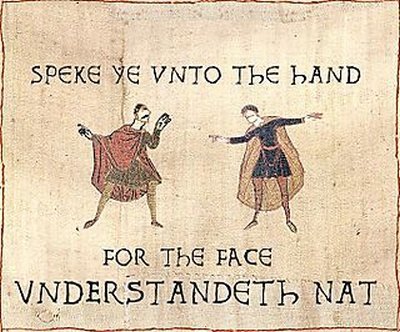 Image courtesy of Mental Floss
Image courtesy of Mental FlossEven commoners would speak more formally than we do today—and the riff-raff, beggars, and laborers would also know just enough to speak with respect to their betters.
We should not make the mistake of thinking formal means ponderous or dull, though. It’s fun to play with that stereotype here and there, especially when writing the dialogue of a pompous, hidebound old windbag. But, formality and a more extensive vocabulary doesn’t mean we can’t have witty, chatty characters that are silly, sexy, and scintillating.
Help Wanted
Elizabeth Bennet did not repine the fact she could not go to university, or become a doctor or a soldier. She operated well-within the confines of acceptable social norms and expectations, and she did so because she naturally accepted that circumscribing and did not question it.
Why would she? It simply was how things were. Yes, she challenged the status quo about marrying for love, but she never challenged marriage or denied that there were only a handful of respectable options outside of marriage for a young lady.
This brings me to something that I see over and over again in stories: the feisty heroine who dreams of becoming X (insert impossibly modern career choice here). That’s not to say that we can’t write a good, convincing story about a heroine who dreams of becoming X, but we have to take a good, long, hard look at her starting place before we do.
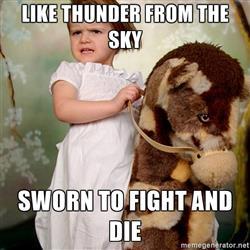 Image courtesy of memegenerator.net
Image courtesy of memegenerator.netSeraphina is bored with embroidering all day and wants to join her brother and become a knight. She’s all about how girls can fight just as well as boys, and girls should get a chance, etc. She tosses her golden hair as she fights openly with her father about wanting to learn how to use a sword.
Cue pickle fork.
Seraphina was always closest to her brother Rolf. They supported and protected each other while growing up in a difficult family situation. When Rolf is called to go serve the king in a crusade, Seraphina panics.
She doesn’t want to be left alone to deal with the difficult family situation at home. She doesn’t think she could handle waiting months or even years for Rolf to come home—if he even makes it home.
She is backed into a corner, but because of her native courage, she makes a daring choice. She convinces Rolf to let her come along in disguise as part of his retinue. Along the way, she has to practice and sharpen up her fighting skills in order to pass for his squire. It’s a different world out there, when wooden swords are replaced with cold, hard steel.
Basically, people need to stop shoving heroines with 21st century values and beliefs into ye olde days. The only way to avoid making this mistake is to read and learn about the cultural values of the period and to immerse our brains into thinking in this way so our characters will behave naturally in harmony with the times.
Not Bread and Cheese Again!
Would people please stop having their characters eat nothing but bread and cheese? There is so much bread and cheese in poorly-researched historical novels that I feel nutritionally-imbalanced just reading about it.
There is no excuse for bread and cheese. If anything, historical food is one of the easiest areas to research! Just type ’18th century English food’ into Google, and BAM! You’ve got blogs, Google Books, PDFs of actual recipe books, and even photos of meals cooked from authentic recipes.
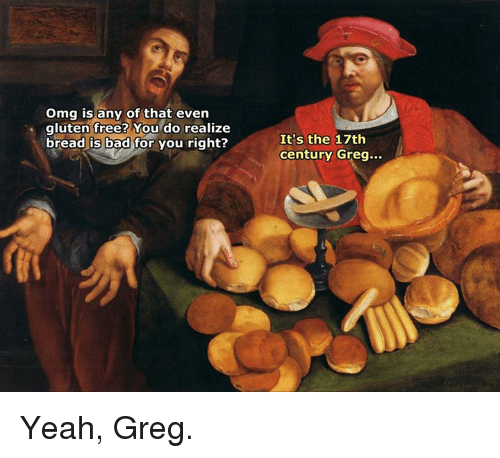 Image courtesy of Me.Me
Image courtesy of Me.MeAlso, pay attention to what your characters are drinking. Well water (hello, giardia)? Beer or ale? Possibly. You could have combination of sherry, wine, and port or brandy with dinner. Be careful of tea, coffee, and hot chocolate before the 18th century. Yes, they were around, but not universally, depending on the decade and country. And, don’t let me catch you talking about hot chocolate like it’s some Swiss Miss crap. Hot chocolate was just that. Hot. Chocolate.
So, next time you want to write food into your scene, don’t settle for Wonder Bread and Kraft Singles. Let loose with Sack posset, quail in puff pastry, Chelsea buns, turnip soup, and Portugal Cakes…with a couple bottles of good Madeira to go along with it all!
Dressing the Part
Our dear Charity has managed to get away from her odious great aunt and is at the house of her friend Isabelle, getting ready for the ball. We the readers are treated to an extensive description of fabric, décolletage, sleeves, overskirts, hems, and lace. Let’s not forget the incredible jewelry, hairstyling, and make-up.
There’s a whole other sermon I could write about the sins of describing outfits. Today, I’ll confine myself to discussing historical accuracy. We need to dress our characters according to their social position, and we know what that means (hint: it involves research). A barmaid will not have a closet full of everyday dresses. If some malmsey-nosed sot spills beer on her, she can’t go home and change. Most likely, she would go rinse out the beer from her skirt because this would be her only summer skirt, and her other outfit would be for winter. Maybe, if she was lucky, she would have one good dress for weddings and funerals, and that dress would probably have been cut down from one of her mother’s in a style of twenty years earlier.
 Yes. That is me. I own a steel-boned corset, and it is damn comfortable!
Yes. That is me. I own a steel-boned corset, and it is damn comfortable!Yes, almost all women who could afford them wore corsets. But, before you have our dear Charity go complain about having to wear a corset, stop. Just. Stop. That would be like complaining about wearing a bra. Yes, we all do it sometimes, and we know it’s possible to go without one. Yet, it’s not really a big deal. It’s just part of what we wear every day.
This also goes for cravats for the gents, because someone, somewhere thought it would be a marvelous little joke to make men strangle themselves every day in the name of fashion.
Clothing wasn’t so much put on as assembled onto a person, with people who couldn’t afford maids helping each other. Both sexes wore stockings (at least up until the early 19th century) with garters to hold them up. There were petticoats and felt strips, chemisettes and buckles.
Just be careful of underwear. Drawers, pantaloons, panties, and small clothes weren’t really all that commonplace until the 19th century. This means if you want to go deep POV, you could mention the occasional strategic draft…
Pickle Forks and POV
The point of all this work is to show, but not show off. Out of everything you learn, only 10% should make it into your book. Wait. Stop. There will be no flipping of tables while reading this blog! Hear me out.
It’s all about understanding POV. What is normal for the character versus what is noteworthy. Think about contemporary fiction: ‘Taylor sat down at the table and helped himself to the potatoes.’ We can easily picture this in our minds. There’s a table, chairs, a dish, a bowl with potatoes and some kind of serving utensil. This sentence could work just as well in historical fiction just as it is (assuming we are working with a time period where potatoes were part of the European diet…and knowing that Taylor as a first name really wasn’t used back then but whatevs): ‘Sir Taylor sat down at the table and helped himself to the potato and gruyere galette.’
We do not need to elaborate just to show off that you verified the status of potatoes or know how dishes were served in the 19th century. There is no real reason we should ever write: ‘Sir Taylor entered the formal dining room where even on ordinary, daily occasions, the family gathered to eat. He settled himself in an ornately carved chair and reached for the porcelain platter with the Potato and Gruyere Galette.’
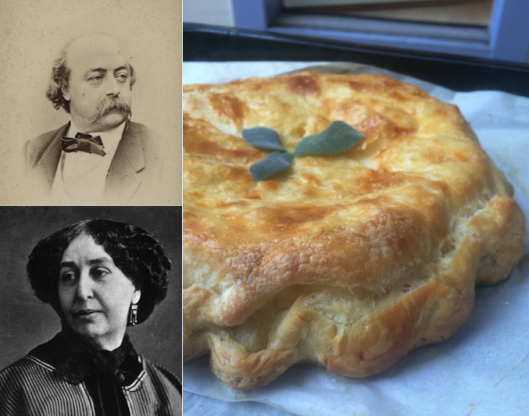 Image (and RECIPE) from paperandsalt.org
Image (and RECIPE) from paperandsalt.orgSome people would snort and point out that there is nothing wrong with that sentence, that it is lovely and descriptive. Yes, it is descriptive, but would Sir Taylor really think about how interesting it was that the family used the formal dining room every day, or how ornately carved his chair was? Do we notice with mild surprise where our dining table is every time you sit down to eat? No? Then, why would Sir Taylor?
Stay focused on the character, the plot, and the action. All I had to do to evoke a fancy, historical feel to the food was to change it from potatoes to an actual recipe (one which George Sand was rather fond of). If I’ve done my job right earlier in the book/chapter/scene, I’ve already given you a feel for the manor house, its size, décor, etc., but all done in the context of dialogue and POV.
So, now that I’ve beat sloppy historical fiction about the head and ears, I’m going to tell you about an opportunity to learn how to do sufficient and efficient research to be credible, interesting, and subtle. I’m offering an online class on Saturday, July 8, from 2:00-4:00 p.m. EST on W.A.N.A.! Information and sign up links are below.
The Class
So, you want to write historical romance. Awesome. Now, you just need to learn everything about that time period. Yay! Yay? Oh…crap.
While we don’t need a PhD in history to write historical fiction, we do need to do your research so that we can avoid the pitfalls of anachronistic language, modern Mary Sues, and the unforgivable sin of having our characters pay morning calls before one o’clock in the afternoon.
But, how do we start researching? And, when do we end? How do we know we know enough to start plotting–let alone writing? How do we keep track of everything we need to remember?
This class answers all those questions and more.
Get a template that guides you through all the steps of research
Discover the tricks of effectively and efficiently using Google and Pinterest
Learn how to use historical context in character development (i.e. no more Mary Sues)
Find out when and how to take research shortcuts…and when you have to buckle down and just slog through it all
Learn how to build a research reference library of your own
Discover how to find non-fiction books that are NOT boring
Develop an understanding of what kind of historical details to put into your story, and more importantly, what to leave out
Research for Historical Romance Writing – Or, How NOT to Lose Six Hours on Pinterest July 8th $35 for Basic/ $75 for GOLD / $125 for PLATINUM
Historical GOLD
You get the class (recording included in price) with Cait plus one hour of personalized one-on-one consulting regarding YOUR story.
Historical PLATINUM
You get the class (recording included in price) with Cait plus two hours of personalized one-on-one consulting regarding YOUR story and bonus worksheets. These worksheets will efficiently guide you through in-depth world-building and research, providing you with consistency for your writing and an excellent reference/style sheet for your editor and proofreader.
****Just FYI, in an effort to combat spammers your comment won’t appear until I approve it, so don’t fret if it doesn’t appear right away.
Talk to me! And MAKE SURE to check out the classes below and sign up! Summer school! YAY!
And to prove it and show my love, for the month of JUNE, everyone who leaves a comment I will put your name in a hat. If you comment and link back to my blog on your blog, you get your name in the hat twice. What do you win? The unvarnished truth from yours truly.
I will pick a winner once a month and it will be a critique of the first 20 pages of your novel, or your query letter, or your synopsis (5 pages or less).
NEW CLASSES!
Obviously, I have my areas of expertise, but I’ve wanted for a long time to fill in some gaps on classes I could offer.
Cait Reynolds was my answer.
She is an unbelievable editor, mentor and teacher and a serious expert in these areas. She consults numerous very successful USA Today and NYTBS authors and I highly, highly recommend her classes.
OMG, Like How to Write Fleek YA July 7th $40 with Cait Reynolds
How to Dominate Your Sex Scenes (No Safe Words Here) July 14th $40 w/ Cait Reynolds
Gaskets and Gaiters: How to Create a Compelling Steampunk World July 21st $35 w/ Cait Reynolds
Lasers & Dragons & Swords, Oh MY! World Building for Fantasy & Science Fiction
July 28th w/ Cait Reynolds $35/ GOLD $75/ PLATINUM $125
Classes with MOI!
Plotting for Dummies July 13th $35 ($250 for GOLD)
Blogging for Authors June 29th $50 ($150 for GOLD)
Branding for Authors July 7th $35
OTHER Classes with Cait Reynolds
Shift Your Shifter Romance into High Gear June 30th $35 Basic/ $75 GOLD/ $125 PLATINUM
Classes with Lisa Hall-Wilson
Growing An Organic Platform On Facebook June 24th $40
June 19, 2017
THIS IS A COUP!
Kristen Lamb made the mistake of giving me admin privileges on her website.
So trusting.
So innocent.
So screwed.
There’s a little more about me at caitreynolds.com – but, be aware that my website is under reconstruction because I got hacked by Bollywood porn spammers. Yeah. That’s the same face I made. However, I’ve posted my manifesto, and that should be a start!
****Just FYI, in an effort to combat spammers your comment won’t appear until I approve it, so don’t fret if it doesn’t appear right away.
Talk to me! And MAKE SURE to check out the classes below and sign up! Summer school! YAY!
And to prove it and show my love, for the month of JUNE, everyone who leaves a comment I will put your name in a hat. If you comment and link back to my blog on your blog, you get your name in the hat twice. What do you win? The unvarnished truth from yours truly.
I will pick a winner once a month and it will be a critique of the first 20 pages of your novel, or your query letter, or your synopsis (5 pages or less).
NEW CLASSES!
Obviously, I have my areas of expertise, but I’ve wanted for a long time to fill in some gaps on classes I could offer.
Cait Reynolds was my answer.
She is an unbelievable editor, mentor and teacher and a serious expert in these areas. She consults numerous very successful USA Today and NYTBS authors and I highly, highly recommend her classes.
OMG, Like How to Write Fleek YA July 7th $40 with Cait Reynolds
How to Dominate Your Sex Scenes (No Safe Words Here) July 14th $40 w/ Cait Reynolds
Gaskets and Gaiters: How to Create a Compelling Steampunk World July 21st $35 w/ Cait Reynolds
Lasers & Dragons & Swords, Oh MY! World Building for Fantasy & Science Fiction
July 28th w/ Cait Reynolds $35/ GOLD $75/ PLATINUM $125
Classes with MOI!
Plotting for Dummies July 13th $35 ($250 for GOLD)
Blogging for Authors June 29th $50 ($150 for GOLD)
Branding for Authors July 7th $35
OTHER Classes with Cait Reynolds
Research for Historical Romance Writing – Or, How NOT to Lose Six Hours on Pinterest July 8th $35 for Basic/ $75 for GOLD / $125 for PLATINUM
Shift Your Shifter Romance into High Gear June 30th $35 Basic/ $75 GOLD/ $125 PLATINUM
Classes with Lisa Hall-Wilson
Growing An Organic Platform On Facebook June 24th $40
June 13, 2017
Let’s Get Real—Authenticity in Fiction
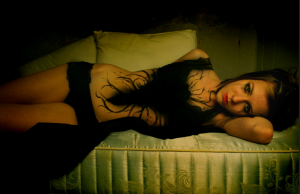 Image via Flickr Creative Commons courtesy of adohnes
Image via Flickr Creative Commons courtesy of adohnesYears ago when I got the idea to write a novel, I did what a lot of new writers do and created the uber perfect protagonist. In fact, when I came up with the original plot idea for The Devil’s Dance, I cast a Sarah Conner badass…and she was dull as dirt and utterly unlikable.
Yay me.
Bizarrely, when those critiquing didn’t like my protagonist, I made her more perfect thinking that would fix it. Um, no. Made it worse. They went from disliking her to kinda wanting to stab her in the face.
Why did I do this? Why did I default to super perfect?
Fear.
Fear of being authentic. I had no concept of what it was like to be perfect. My family resembled Season Two of the Jerry Springer Show. After my parents divorced, my dad disappeared for years only to resurface and take a job as a cashier at Stop-N-Go so he could get out of paying the originally allotted child support. I was never #1 at anything (unless one counts truancy). Terrible at sports, last to be picked and the first to get nailed in the face in a game of dodge ball. I dropped out of high school…TWICE.
When it came time to write a story, I wrote the version of me that never was and likely never would be. She was…perfect.
And again, dull as dirt.
For a long time I was tremendously embarrassed about all the best material for a great story (stuff I knew, had experienced in MY life). In short, I was afraid to be authentic. So, after countless versions of my perfect character, I relegated her to the recycle bin and started again with a new character…Romi.
I discovered that I was far better at writing messed up people with imperfect lives, lots of baggage who were working through pain in imperfect ways.
Thus, today, I have a guest who is one of my closest friends and has been critique partner of mine for years, Lanette Kauten. She loves literary fiction almost as much as I love tormenting her for loving literary fiction. But Lanette is excellent at creating very flawed and interesting characters with lots of layers, so who better to ask to guest post about writing authentically?
Take it away, Lanette!
****
 Image via Flickr Creative Commons courtesy of Gerald Gabernig
Image via Flickr Creative Commons courtesy of Gerald GabernigWriting is a great adventure because we get to explore worlds and characters, diving into the psychology of humanity. And we long to share these wonderful stories we’ve created with the world!
In doing so, it’s natural to put a piece of ourselves, our worldview, into the stories. We want to share things—a belief or a bit of wisdom—but the question is how to do it without sounding didactic. Religious writers have a reputation of moralizing their stories and not coming across as authentic.
Is that a fair criticism? Maybe for some, but it’s not a brush that can be applied liberally.
Look at Dean Koontz. He’s a Catholic, and his books are amazing! Sometimes his readers can detect his overall worldview in his stories, but not always. He simply churns out good stories. Though he did write the most kick-ass salvation scene in his “Prodigal Son” series. Let’s also not forget about the works of two other great writers who happen to be Christians—Tolkien and Flannery O’Connor.
But what about books with other religious elements?
 Image via Flickr Creative Commons courtesy of Sukanto Debnath
Image via Flickr Creative Commons courtesy of Sukanto DebnathI’m glad you asked because now we’re getting to the crux of this post. Life of Pi is not a Hindu novel. The Kite Runner is not a Muslim novel.
Both of those books portray beautiful stories, and are simply novels told from the worldviews of their respective authors. Yes, the main characters have religious beliefs. It’s part of who they are, and to deny it on the one hand or to make the stories all about that on the other wouldn’t have been authentic. And readers would’ve tossed the books aside without ever thinking about them again rather than gush about how great those two books are.
 Image via Flickr Creative Commons courtesy of Navaneeth Kishor
Image via Flickr Creative Commons courtesy of Navaneeth KishorMy novels are written from my worldview, but anyone would be crazy to call them “Christian fiction.” My characters are a part of the world they live in and act accordingly.
I don’t attempt to hide from real life or shove my characters into a derivative little box. In one of my books, the main character is a confused atheist who escaped from her upbringing in a weird, Charismatic church. Even though she wants nothing to do with her parents’ religion, one of her closest friends is a Jesus freak guru who owns a club in an art district, and one of his employees is a pothead who believes just as strongly in aliens as he believes in Jesus.
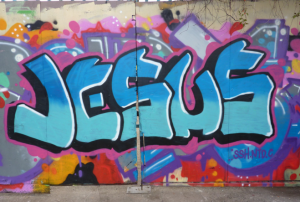 Image via Flickr Creative Commons, courtesy of erokism
Image via Flickr Creative Commons, courtesy of erokismThe book isn’t about her struggle with religion, but it’s a part of who she is. To cut all that out wouldn’t be true to her or to the story. However, to make the story about religion wouldn’t be honest either. Here I am as a Christian with a book about an atheist in a lesbian relationship, struggling to figure out where she belongs in this world. I don’t shy away from realistic people and situations.
For me, authenticity is key.
Readers are smart and can detect a false note as easily as hearing a wrong note played in their favorite song. It doesn’t matter what worldview you bring to your story (we all bring our beliefs and experiences into our stories); whether we’re Christian, Muslim, Buddhist, Pagan, Atheist, or whatever, we are wise to be authentic. We must strive to be honest in order to show the world as it really is.
Great. That sounds wonderful. How do we do it?
Be Vulnerable
Share your pain, your loss, your doubts. To be human is to feel. Dump your emotions on that page. Open up your vein and bleed. (Not literally. Please don’t bleed on your computer. It’s sticky.) Don’t shy away from the difficult questions because many of your readers will pick up on that and will feel cheated, and don’t edit your emotions as you write. Editing comes later.
Personalize It
This is similar to vulnerability, but here is where you get to shine. Share your worldview as something personal to you. Beliefs have broad implications, but they also have personal elements. Open up the beauty of that world to us in a way that feels real by focusing on the minute details. So often the smallest things have the biggest impact.
Know Your Characters
Your characters are key to showing their own authenticity. Let’s say you’re writing a Christian book, and your character is in a difficult position. Maybe she learned that a friend stole some money and that friend knows a secret about her. If she reports her friend, she knows her secret will be out.
What would your character do? Don’t think about the moral lesson you want to impart, but think about her personality, beliefs, what drives her, and how big the secret is (the bigger, the better) and have her act as she naturally would.
I write literary and some women’s fiction, so my novels are grounded in real life, yet when I say you have to show the world as it really is, I don’t just mean contemporary or literary fiction. You can write fantasies or sci-fi with amazing new worlds, but what is that secret ingredient that elevates the forgettable story to the unforgettable one? Writing our characters and stories with honesty.
***
Thank you, Lanette! I hope y’all will check out her books and befriend her on Facebook. Also Lanette will be at Jamie Lynn Boothe’s launch party on Facebook tonight so I hope y’all will come by.
What are your thoughts? What resonates with you? What do you try to impart onto your characters to make them “real”? Are you like I was and terrified to be imperfect? It’s cool. We all do it. And, frankly, perfect characters also serve a role in other types of fiction (I.e. James Bond), so I don’t want to pick on them too much. Do you enjoy authenticity or prefer the escape of perfection? No wrong answers, btw.
I LOVE hearing from you and comments for guests count double in my contest.
****Just FYI, in an effort to combat spammers your comment won’t appear until I approve it, so don’t fret if it doesn’t appear right away.
Talk to me! And MAKE SURE to check out the classes below and sign up! Summer school! YAY!
And to prove it and show my love, for the month of JUNE, everyone who leaves a comment I will put your name in a hat. If you comment and link back to my blog on your blog, you get your name in the hat twice. What do you win? The unvarnished truth from yours truly.
I will pick a winner once a month and it will be a critique of the first 20 pages of your novel, or your query letter, or your synopsis (5 pages or less).
NEW CLASSES!
Obviously, I have my areas of expertise, but I’ve wanted for a long time to fill in some gaps on classes I could offer.
Cait Reynolds was my answer.
She is an unbelievable editor, mentor and teacher and a serious expert in these areas. She consults numerous very successful USA Today and NYTBS authors and I highly, highly recommend her classes.
OMG, Like How to Write Fleek YA July 7th $40 with Cait Reynolds
How to Dominate Your Sex Scenes (No Safe Words Here) July 14th $40 w/ Cait Reynolds
Gaskets and Gaiters: How to Create a Compelling Steampunk World July 21st $35 w/ Cait Reynolds
Lasers & Dragons & Swords, Oh MY! World Building for Fantasy & Science Fiction
July 28th w/ Cait Reynolds $35/ GOLD $75/ PLATINUM $125
Classes with MOI!
Pitch Perfect—How to Write a Query Letter & Synopsis that SELLS May 25th $45
Plotting for Dummies July 13th $35 ($250 for GOLD)
Blogging for Authors June 29th $50 ($150 for GOLD)
Branding for Authors July 7th $35
OTHER Classes with Cait Reynolds
Research for Historical Romance Writing – Or, How NOT to Lose Six Hours on Pinterest June 24th $35 for Basic/ $75 for GOLD / $125 for PLATINUM
Shift Your Shifter Romance into High Gear June 30th $35 Basic/ $75 GOLD/ $125 PLATINUM
Classes with Lisa Hall-Wilson
Growing An Organic Platform On Facebook June 24th $40
June 9, 2017
Why the World Needs More Inspirational Romance
 This GORGEOUS image via Flickr Creative Commons, courtesy of Aimannesse Photography
This GORGEOUS image via Flickr Creative Commons, courtesy of Aimannesse PhotographyStories have been around since the dawn of time, since the birth of communication. Stories have always served a vital role in human culture, yet in our modern “sophisticated” world, it’s all too easy for many to dismiss novels as “escape.”
Though, in fairness, spend ten minutes on Twitter and escape ain’t necessarily a bad thing. All genres have unique purposes. Fans of one genre might not “get” fans of another.
As writers we also have our biases, maybe even think some genres are more valuable than others. Or even that genre fiction isn’t valuable at all. Yeah , we’ll post on that another time. It’s okay.
Though today, we’re going to talk about Inspirational Romance, I will admit…
We All Have Our Pets
For instance, I love horror. Some people think I’m nuts, but horror relaxes me. Why? Fear often does the most damage when it’s gray and nebulous. Few things are more terrifying than the unknown.
In fact, Stephen King in Danse Macabre makes a really interesting point that the most terror-filled moments are when we are creeping up the stairs and this unknown thing is banging at the door.
The reader tenses, feels sick, his nerves are shredding with every passing second and when the door is opened? There is a scream!
But it is not just a scream of terror. It’s also a scream of relief.
The human mind has a remarkable ability to be able to process and face what it can see. So when the door opens it’s a ten-foot bug, the reader screams but at the same time (though perhaps subconsciously) thinks, “Whew! At least it wasn’t a fifty-foot bug. A ten foot bug? I can make a plan.” And if it was a fifty-foot bug, the reader would think, “Whew! Well at least it wasn’t a five hundred foot bug!”
Y’all get the gist.
Horror helps ease our general anxiety by putting a name on a monster we can see, face (open the door) and then defeat. We might need Xanax and a bag of cookies when faced with trolls and mob violence, but a movie like The Purge places that generalized fear into a specific story and the hero overcomes. The thing is exposed.
We read (and write) stories for all kinds of reasons. Personally, not only do I love horror, but I love mystery, suspense and thriller because for me? I crave a sense of justice in an all too often unjust world. In a recent guest post about my new book, I said this:
Thus today, I’d like to hand off to a long-time follower of mine on social media and Facebook friend. It’s always a joy to bring guests who write genres different than mine, to hear from them. Jamie Lynn Booth writes Inspirational Romance and I thought, in light of all the doom and gloom we face each and every day, that this might be a cool topic to discuss. Why the world needs Inspirational Romance. Take it away Jaime!
***
 Image courtesy of Flickr Creative Commons
Image courtesy of Flickr Creative CommonsI want to start off by saying it is a great honor and privilege to be asked by Kristen Lamb to write something for her blog. Thank you, Kristen.
So, why does the world needs more Inspirational Romance? It was Kristen’s idea, and I loved the topic.
I think we can all agree on the fact that there is an incredible amount of evil in our beautiful world. On the other hand, there is also just as much love and beauty. The sad part is that the media doesn’t show nearly enough of that. All we hear about and see on the news is the violence, for the most part. With Facebook, Twitter, newspapers and television, it’s basically what we see the most of.
 Image courtesy of Flickr Creative Commons
Image courtesy of Flickr Creative CommonsFor me, I do my best to not focus on the negative. I know it’s out there and I keep up with some of it so I don’t get completely lost. But for me, I need to keep my heart and soul with the love and romance that is longing to be held, grasped, desired and wanted. We all have love in our hearts. We all want to give and receive love, right? Love is a natural emotion. In my opinion, the most powerful one.
So, when I sit at my desktop I already know pretty much what I want to write about. The idea has already been placed in my head. First, before I begin working on my WIP, I have to ask for guidance from God. Without Him, I wouldn’t have this gift in the first place. Then, I let my muse run free.
I believe with the stress of everyday life we need inspiration. For a lot of folks, love has been lost or desired, we need an uplifting romance to fill the void. To be able to sit in your most comfortable chair, out on the deck, or in your bed and allow another scene or world take you away. I believe it’s not only therapeutic, but magical.
There are times in all our lives when we need to be inspired. Times when we all need to have God, or whatever Higher Power you believe in, to comfort us. Reading an Inspirational Romance about someone who has or is going through struggles but gets through them is powerful. A message is embedded within. When the character breaks through the barrier and finds love it makes it even better.
Most of us can relate on many levels with what we read. I love writing a novel that not only reaches into the depths of your soul, but grips your emotions. In everything I write, somewhere within is a part of me. Something I have experienced.
A great example of this is my new release, Never Again. Which is releasing on June 13th and is the first book in the series.
Blessed with a good life and the perfect love, Sam couldn’t be happier. On vacation with her adoring husband, she is convinced that everything is exactly as it should be…until it’s not. One accident sets off a string of events that forces Sam to watch her life fall apart piece by piece. Loss, grief, betrayal—and the revelation of a long-kept secret have Sam questioning whether she will ever be able to find the happiness she once had.
She’s broken, her heart shattered, her trust ruined, and her faith is tested as she tries to survive the Hell her life has become. Now Sam needs to decide if she’s brave enough to move on, or if she’ll never again find a love worth living for.
I think it’s safe to say we’ve all been broken. We’ve been in that spot where we thought we had nothing left. It was too much to simply put one foot in front of the other. Have you been there? I know I have.
Yet, through Inspirational Romance, we can connect with characters experiencing similar circumstances, trials, emotions and brokenness and, though we might be not able to see light in our dark moment? Through them we can. Regular ordinary people without superpowers or space ships and with more broken places than baggage, finding the courage to dare to move forward. To not only move forward, but, in the end trade their ashes for beauty.
***
Thank you Jamie! Really appreciate you taking the time to blog here. I know it’s work and can be pretty terrifying for the first-timers, so thanks for being brave.
I LOVE hearing from you! (and remember comments for guests count double for my contest).
What are your thoughts? I know we have some Inspirational Romance folks in the crowd who probably can add to this. Why do you love it? Read it? Write it? What is it about Inspirational Romance that speaks to you and why do you think the world needs more of it? I know I do.
Other genres! What do you love and why? Who does the world need more fantasy, science fiction, YA, whatever? I want to hear from you too!
By the way, y’all can follow Jamie on Facebook, Goodreads, Twitter, and Amazon.
****Just FYI, in an effort to combat spammers your comment won’t appear until I approve it, so don’t fret if it doesn’t appear right away.
Talk to me! And MAKE SURE to check out the classes below and sign up! Summer school! YAY!
And to prove it and show my love, for the month of JUNE, everyone who leaves a comment I will put your name in a hat. If you comment and link back to my blog on your blog, you get your name in the hat twice. What do you win? The unvarnished truth from yours truly.
I will pick a winner once a month and it will be a critique of the first 20 pages of your novel, or your query letter, or your synopsis (5 pages or less).
NEW CLASSES!
Obviously, I have my areas of expertise, but I’ve wanted for a long time to fill in some gaps on classes I could offer.
Cait Reynolds was my answer.
She is an unbelievable editor, mentor and teacher and a serious expert in these areas. She consults numerous very successful USA Today and NYTBS authors and I highly, highly recommend her classes.
OMG, Like How to Write Fleek YA July 7th $40 with Cait Reynolds
How to Dominate Your Sex Scenes (No Safe Words Here) July 14th $40 w/ Cait Reynolds
Gaskets and Gaiters: How to Create a Compelling Steampunk World July 21st $35 w/ Cait Reynolds
Lasers & Dragons & Swords, Oh MY! World Building for Fantasy & Science Fiction
July 28th w/ Cait Reynolds $35/ GOLD $75/ PLATINUM $125
Classes with MOI!
Pitch Perfect—How to Write a Query Letter & Synopsis that SELLS May 25th $45
Plotting for Dummies July 13th $35 ($250 for GOLD)
Blogging for Authors June 29th $50 ($150 for GOLD)
Branding for Authors July 7th $35
OTHER Classes with Cait Reynolds
Research for Historical Romance Writing – Or, How NOT to Lose Six Hours on Pinterest June 24th $35 for Basic/ $75 for GOLD / $125 for PLATINUM
Shift Your Shifter Romance into High Gear June 30th $35 Basic/ $75 GOLD/ $125 PLATINUM
Classes with Lisa Hall-Wilson
Growing An Organic Platform On Facebook June 24th $40
June 5, 2017
Reality vs. Expectations—Remaining Calm When it ALL Goes Pear-Shaped
Today we are going to talk about something potentially embarrassing, but hey I have no shame. But I believe this is a cool thing because I talk about stuff A LOT of people have been through, but few are bold enough to talk about let alone post it in a blog for all to see.
The old way of being a “professional” was to portray you were perfect. Spin everything. Maybe some people still do that, but meh. Not my style. I take the hard hits then talk about them so you guys can learn and to me? That’s more important than anyone thinking I am “perfect.”
So…
Want to know who people really are? Three ways. One. How do they act when they have everything? Two. How do they act when they have nothing? Three. How do they act (respond) when the proverbial caca hits the fan?
For the purposes of today’s blog, I’m interested in number three because it involves a lot of number two (the stinky kind). Before we start though, we must understand that….
Life is NOT Hermetically Sealed
I’d love to say that every time some land mine blew up in my face that my response soooo perfect that Mother Theresa was looking down gettin’ all jealous. That I handled said caca with grace, maturity, kindness, love, yoga, bible study and inspirational quotes. That my response did NOT involve a hell-mouth opening beneath my feet and then spewing out of my mouth. That my reaction did not involve a blast radius.
But one thing I promise on this blog is honesty.
One thing we must learn to be successful in this profession (or any other) is to forbid outside circumstances to own, control or derail us.
Sounds easy in an inspirational quote. The doing? Not so much.
How are we going to handle it when the proverbial caca hits the fan?
Because it is GOING to happen. It isn’t a matter of if, rather a matter of when.
If we allow ourselves to be at the mercy of circumstances? We’re going to be miserable and we’ll never finish the blog or the book. We’ll give up, tap out and take every carb in the house down with us.
Though I’m not where I’d like to be? I’m a hell of a lot better than I used to be. Making the decision to become a writer was the single best thing I could ever have done to grow my character, to mature me and to make me a better (not perfect) person.
Successful people don’t avoid stress, they learn to manage it….often the hard way. Yay!
Managing Expectations
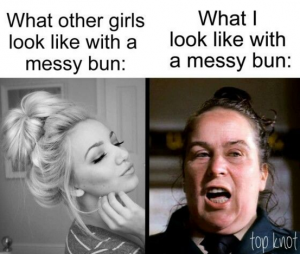
A lot of why we make ourselves miserable and end up depressed is that our expectations fail to meet with what reality delivers. If you ever want to see this in action, just watch Bridezilla clips off YouTube. The bride has this absurd expectation of what the wedding day should be, an expectation that reality cannot meet (No, sorry, we cannot have cherubim deliver you to the altar on a cloud)…and they implode.
A sinkhole forms around the bride that eats all the bridesmaids, the caterer, the flower girl…and the groom is just standing there like he’s just landed at Normandy.
Expecting too much? Can be problematic.
But we need to be careful about the other side of this emotional coin—especially those of us from crazy dysfunctional families. We can stray to the opposite side of the spectrum and that’s dumb too. Maybe we’ve gone through a lot, been let down a lot so we just expect nothing. Or worse, we expect bad things to happen. We expect to be let down.
That is bad juju as well.
Thus, there is this fine dance we must master between expecting great things, but also being prepared for everything to just go sideways, too.
$h%t WILL Hit the Fan
Going to let y’all in on a little secret. Lean closer. This will blow your mind. Publishing involves…humans. Humans who screw up, make mistakes, etc. Even better? Now that we’re in the digital age? Humans can screw up much FASTER and INSTANTLY.
Great right?
Sometimes things will go great. When I self-published Rise of the Machines? It was glorious. Beautiful cover, perfect formatting, not a single typo *gets cramp patting self on back*. Of course this was all run by Control Freak Perfectionist Kristen and I damn near killed myself doing it all on my own.
That and Hubby wondered if he needed to bring me more coffee or perhaps toss holy water on me.
The power of Christ compels you!
I’d written a novel The Devil’s Dance (ha ha). I even sent the manuscript to an agent friend who was unafraid to make me cry, just to see if the book was solid. Her answer? Great book and I don’t even like that genre. Thus, I felt cool to query. And I queried and queried and got a lot of “Love the story and the voice but not for us.”
See? Even I get rejected 
May 30, 2017
Running YOUR Race—Be Content Yet Stay HUNGRY
My goal for this blog has always, always, always been to be honest with you guys, to offer tough love and guidance and support. Because the world has three kinds of people, but two are the most common. Two are not exactly helpful and can be downright toxic. We will start with these folks, then move on to how to win that race!
The Discourager (Enemy)
This is the person who’s going to tell you what you’re unable to do. That it’s too hard, that you’re stupid for even trying.
You want to be a successful author? Seriously? Everyone can be published. It means nothing. Do you have any idea the competition that’s out there? You need a mega-marketing budget and even then you’ll probably fail.
Okay I need to stop there because I’m depressing myself.
These people are poison and I’ve dedicated many a blog to showing you why they need to go and giving tips for getting these people OUT of your life. They need to go if you hope to do ANYTHING remarkable.
The Sugar Coater (False Ally)
[image error] Original image via Lucy Downey from Flickr Creative Commons
Then there is the sugar-coater. This person might tell you it’s easy to make a million dollars writing a book…if you just BUY and DO this plan. A lot of folks out there willing to sell a dream. So caveat emptor there. This type of sugar-coater has lots to gain, namely money.
Yet, when we are chasing gimmicks, we’re not doing the two most important activities every writer must do—writing more books, building that platform/brand.
The sugar-coater might also be people around us in, say a critique group, who tell us everything we write is better than unicorn hair. Friends who think everything we write is genius.
While these folks are great encouragers, they might not be what we need. Too much sugar bad for us 

